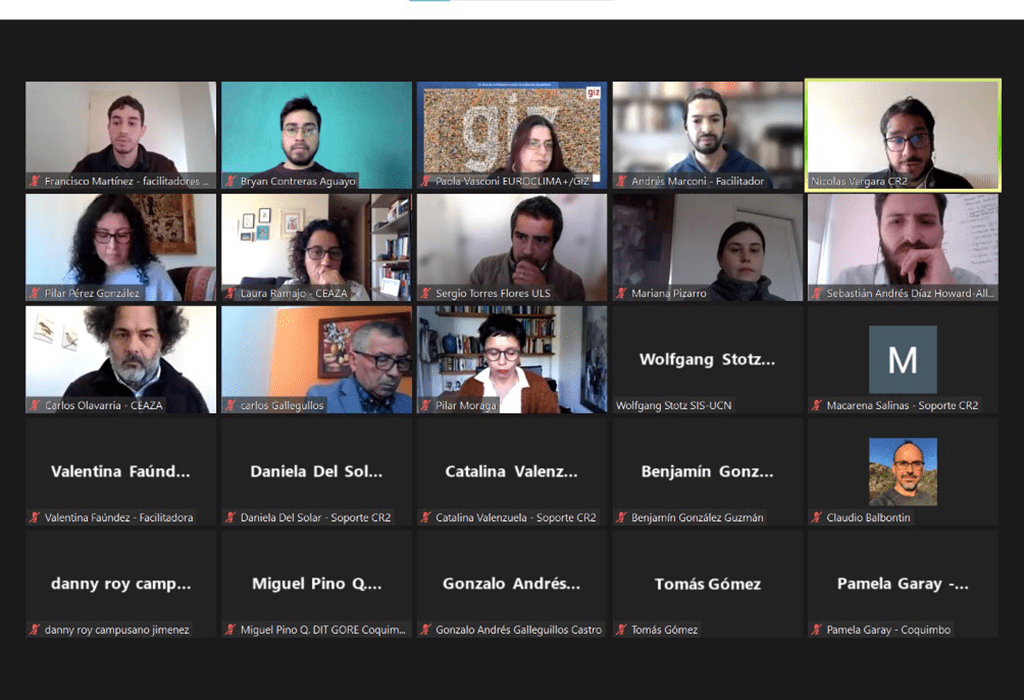Santiago de Chile, 9 August 2021. EUROCLIMA+, through the German Society for International Cooperation (GIZ), in partnership with the Chilean Ministry of the Environment
(MMA) and with the support of the Centre for Climate Science and Resilience (CR2) of the University of Chile, started a programme for institutional strengthening and capacity building at sub-national level, in the context of the elaboration of the preparation of its Long-Term Climate Strategy (LTCS), a key instrument to achieve carbon neutrality and resilience in the country, which Chile intends to present at COP26 in Glasgow.
The main objective of this programme is to strengthen the institutional and technical capacities of the Regional Climate Change Committees (CORECC) for the management of climate change in the territory, as it is these committees in Chile that promote and facilitate low-carbon and climate-resilient development in the regions, through the development and implementation of policies, plans and actions in this area and integrating the different sectors and levels of management; among these instruments is the Regional Climate Change Action Plan (PARCC).
The strengthening programme considers two lines of work, the first called 'Dialogues between Authorities', aims to generate an occasion for meeting with the aim of promoting a dialogue between the authorities that comprise the CORECCs, regarding the role and regional challenges in the development and implementation of public policy on climate change, in particular with respect to the LTCS to 2050. The second line of 'Technical Capacities' is focused on the delivery of tools and technical knowledge to strengthen the capacities of these committees for the planning and implementation of climate action in the territory.
The Dialogues with the Regional Climate Change Committees (CORECC) began on 9 August contemplating the holding of three types of meetings, the first at regional level, then a macro-zonal one and finally a national meeting.
The first round of Regional Dialogues takes place in each of the 16 regions of the country, through a session with CORECC members with the aim of generating a dialogue on regional and local integration in the Long-Term Climate Strategy through, for example, the PARCCs, and the opportunities in each region to strengthen climate management by incorporating it into different planning instruments at the sub-national level.
The sessions are divided into two blocks, first a general welcome by the CR2 team, a representative of EUROCLIMA+/GIZ and an introduction and greeting by Carolina Urmeneta, head of the Climate Change Office of the MMA, where she will explain the objectives of the project and the working methodology of the workshop and finally, space will be given to the regional authority present. In addition, there will be an introductory presentation to the Long-Term Climate Strategy (LTCS) by Pilar Moraga from CR2 and finally the results of a survey carried out a few weeks before will be shared with the members of each CORECC are shown in order to have an overview of what the group thinks should be discussed in the group rooms.
The second block will start with small work groups of the participants where they were asked two questions that emerged as a consequence of the results of the survey. The questions are: 1) What are the main barriers/challenges in your region for the Regional Climate Change Plan? Refer to the main constraints regarding funding and linkage with territorial actors; 2) What are the main challenges in your region to linking territorial planning and development instruments with climate change management instruments? (e.g. LTCS and Communal Development Plan). At the end of the discussion, one representative per room will present the group's findings and there will be reflection about them in the closing plenary.
In closing, words of thanks will be given to the people attending the dialogue and reference will be made to the next steps for the CORECC groups, and a satisfaction survey will be sent out for the evaluation of the activity.
The cycle of Regional Dialogues will continue with the next scheduled exchanges until 20 August, upon finishing the first meeting, macro-zonal meetings will be held from 24 to 26 August and these will conclude with a national session on 31 August.
About EUROCLIMA+
EUROCLIMA+ is a programme funded by the European Union and co-financed by the German federal government through the Federal Ministry for Economic Cooperation and Development (BMZ), as well as by the governments of France and Spain. It aims to reduce the impact of climate change and its effects in 18 countries of Latin America and the Caribbean by promoting climate change mitigation and adaptation, resilience and investment.
The Programme is implemented under the synergistic work of seven agencies: the Spanish Agency for International Development Cooperation (AECID), the French Development Agency (AFD), the Economic Commission for Latin America and the Caribbean (ECLAC), Expertise France (EF), the International and Ibero-America Foundation for Administration and Public Policy (FIIAPP), the German Society for International Cooperation (GIZ), and the UN Environment Programme.

